What's it all about:
It was the middle of June 2012, just a standard day in the office, I was having a cuppa and reading some tech news in between the usual admin and beating another Windows server into submission.
Then I saw a post, can't remember where now, maybe DIYDrones, a blog or a snippet from that search engine, but someone was trying to put a small satellite called a CubeSat in to Low Earth Orbit [LEO]. They were attempting to raise the funds via Kickstarter and offering time to anyone interested!
Over time, most satellites have got larger, to last longer they have added batteries/solar cells/fuel etc. to provide more power for communications and spread the costs over a longer operating life. Sputnik weighed in at about 84 Kg, which was large compared to the craft the Americans were working on at the time. Telkom3 and Express MD2, the two satellites that failed to get into to the correct orbit on Aug 6 2012 had a combined weight of around 3000 Kg and the Hubble space telescope weighed in at 11000 Kg at launch. To paraphrase Dr Bob Twiggs, one of the inventors of the CubeSat, everything else has been miniaturised and performance has been enhanced, why not satellites?
Over the last few years, more people have begun to agree with him and space research is changing, CubeSats have a low[er] cost of entry for space research and are bigger than a Tubesat, [an idea from Interorbital Systems [IOS]], but like may space related ventures IOS seem to be going nowhere slowly. The industry view of the CubeSat platform has changed over the years, they were originally being seen as a bit of a 'toy' now they are viewed as a real platform for space research at a lower cost.
Dan Dare and I have been hooked on the great unknown for a long time, so I fired up my web browser to take a look at the Kickstarter project.
Now I like a good formula:
CubeSat: a small satellite and this one available to the public
+
Arduino: easy to program micro-controllers
+
Lots of sensors: opening avenues of research
+
People who look like they know what they're doing: the Ardusat team with contacts at NASA
=
Fantastic idea:
And this idea looks like it might take off, literally, in to orbit!
It needs just one extra added ingredient, if it's going to inspire school children, it needs enthusiastic local people to help schools connect with this new technology and that's where I can help.
From my perspective, it seems to me the the UK Government thinks that the future for UK PLC is Info Tech + High Tech & the value added end of manufacturing. But what makes them think that boring Power-point presentations are going to turn our children on to IT & High Tech? Does the creation of a Word document produce any useful end result?
My interest in science was kindled at school by the radioactive samples, Geiger counter and seeing Brownian motion, I remember colourful exothermic reactions in the playground by a teacher with a Black Powder license and will never forget the short lecture when our Chemistry teacher demonstrated how to make tear gas & poured too much of the two active ingredients on the floor, with predictable results...
IT was in its infancy in those days, my brother used to bring punched tapes back from his school as they had access to a 'real' computer at the local university. He enjoyed that early hands on experience enough to make a career of programming.
I think health & safety & Power-point presentations can stifle the excitement of learning. Getting access to equipment you don't see every day of the week can open your eyes to the wider possibilities of life.
This is why I'm passionate about Open Source Software [OSS or FOSS] and Open Source Hard [OSHW]. Not only is it free, it offers you freedom:
the freedom to use the work and enjoy the benefits of using it.
the freedom to study the work and to apply knowledge acquired from it.
the freedom to make and redistribute copies, in whole or in part.
the freedom to make changes and improvements and to distribute derivative works.
Whether it is OSS or OSHW, you can either use it as it is or take it, modify it and make it do what you want. Leave your PC on the desk, it's complicated, it doesn't like being messed with and doesn't interact with the physical world. Pick up an Arduino.
There are a few Arduino micro-controllers.
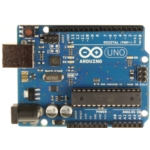 |
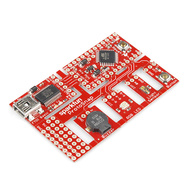 |
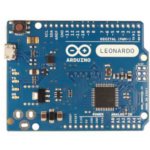 |
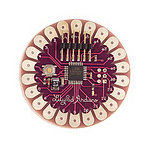 |
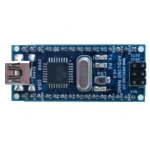 |
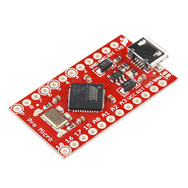 |
They can be combined with a few simple components to make an amazing variety of useful devices. Add a One-wire temperature sensor, a resistor and you've made a digital thermometer, add a radio module and you can measure a remote temperature, add a GPS and you know the location. Fasten this to a balloon and you can track temperature up through the atmosphere to a height where only a few people normally have access.
NanoSatisfi, is the company behind the Ardusat CubeSat that I have sponsored. I have experimental time on Ardusat, with access to every sensor, from the Geiger counter to an open-source spectrometer (called Spectrino), magnetometers, strain gauges, vibration and shock sensors, gyroscopes and accelerometers, cameras and more. At my request have added an extra temperature sensor that can measure an object temperature by pointing the satellite towards it.
I would like to share this satellite access with local schools.
I'm offering access to this satellite and several high altitude balloons. We have some materials and are designing electronics and integrating the software needed. We have lots of ideas and development work is under way.
Do you have the enthusiasm in integrate space and high altitude science in your classrooms? Could your students create ideas for experiments and help design, run and analyse their own experiments and data?
Want to know more? - find me at: ardusat@tiouk.dot.com
I hoping that today's children and teachers will be as excited by new possibilities as I was many years ago, sitting cross legged on the hall floor in junior school watching grainy black and white footage of an American hopping down a short run of steps, uttering the now famous words "One small step...." I didn't realise the significance then of course, I wanted to know, would he find The Mekon?
Go in to space with tiouk.com & Ardusat, see what this generation can find